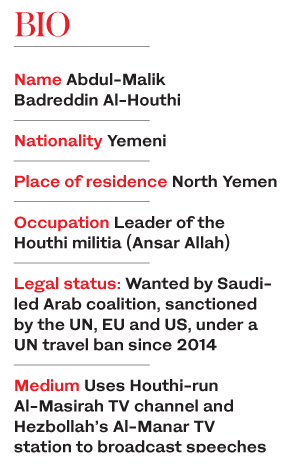JEDDAH: When it comes to preaching hate and unleashing terror, the Yemeni rebel leader Abdul-Malik Al-Houthi stands right beside Osama bin Laden, Hezbollah chief Hassan Nasrallah, Iranian militia strongman Qassim Soleimani and Daesh leader Abu Bakr Al-Baghdadi.
The 40-year-old Al-Houthi and his armed militia have been sanctioned by the UN Security Council for overrunning Sanaa, the Yemeni capital, and for sending the country’s legitimate and internationally recognized government into exile in January 2015.

The Iranian-aligned Houthis have always been renegades. Hiding in the mountains of Sadah in northern Yemen, they ran a parallel autonomous entity and never sought involvement in any peace process or power sharing. And in late 2014, while the Yemeni political class and military were embroiled in a power struggle, the Houthis seized the opportunity to take over the country.

According to the UN Security Council, “Abdul Malik Al-Houthi is a leader of a group that has engaged in acts that threaten the peace, security or stability of Yemen. In September 2014, Houthi forces captured Sanaa and in January 2015 they attempted to unilaterally replace the legitimate government of Yemen with an illegitimate governing authority that the Houthis dominated.
“Al-Houthi assumed the leadership of Yemen’s Houthi movement in 2004 after the death of his brother, Hussain Badreddin Al-Houthi. As leader of the group, Al-Houthi has repeatedly threatened Yemeni authorities with further unrest if they do not respond to his demands and has detained President Abed Rabbo Mansour Hadi, the prime minister and key Cabinet members. The president subsequently escaped to Aden. The Houthis then launched another offensive toward Aden.”
The US has also imposed sanctions, including a travel ban, on Al-Houthi for threatening Yemen’s stability. Following the US lead, the EU has also imposed an arms embargo and further sanctions on the rebel leader.
With their slogan “God is great, death to America, death to Israel, a curse upon the Jews and victory for Islam,” the Houthis have a long history of intolerance. They have detained foreign nationals, as well as Yemenis, and have been accused of expelling or oppressing members of the rural community of Yemeni Jews in northern Yemen.
In an interview aired on Yemen Today TV on Jan. 22, 2013, Rabbi Yahya Youssuf Salem, head of the Jewish community in Yemen, said that in 2007 the Jews were forced to leave their hometown in Saada “because of the threats (they) were getting from the Houthis.”
“They took our homes, our land and our cars. They even took my historical library,” Salem said.
The Houthis also have been accused of detaining and torturing members of the Baha’i community.
Al-Houthi targeted the Baha’is in a speech aired on Al-Masirah TV on March 23, 2018, in which he accused followers of the faith of being “satanic” and “agents” of the West.
The militant leader has also turned his sights on targets further afield.
In an address on Al-Masirah TV in 2016, Al-Houthi claimed he feared for the safety of Makkah. But on Sept. 14, 2017, on the same channel, the Houthi terror chief said that Yemenis should take their cue from North Korea and focus on the development of missiles. “To have rockets that could reach far beyond Riyadh, this is a great achievement,” he said.
According to Saudi political analyst Hamdan Al-Shehri, the Houthis support the doctrine of Vilayat-e-Fakeeh (Guardianship of the Islamic Jurist) — the same theory propagated by Iranian clerics.
“The concept grants the supreme leader ultimate authority to pass any edict against anybody and everybody, condemn any community, deride any religion, and call for the death and destruction of all those who (disagree),” Al-Shehri said. “The supreme leader’s followers must carry out his orders because he is considered next only to God.”
Al-Houthi is cut from the same cloth as Iranian leader Ali Khamenei, said Al-Shehri. “Al-Houthi has no qualms about putting children and women in harm’s way ... this is the exact strategy employed by other militias and terrorist organizations, including Hezbollah, Al-Qaeda and Daesh.”
Few people realize how Saudi Arabia and the Arab coalition were forced into the war in Yemen, Al-Shehri said, referring to Europe’s fight against Hitler in World War II. “That war resulted in huge losses, but the evil of Hitler had to be uprooted,” he said. “Al-Houthi is (no less a threat) than Hitler. Their ideologies are similar; both are rooted in hate.”
Al-Shehri said it is unfortunate that the outside world sees the Houthis as underdogs.
“The Houthis have launched hundreds of missiles into Saudi Arabia,” he said. “They even launched them at the Holy City of Makkah. They have sent their ballistic missiles into densely populated civilian areas. For such people, nothing is sacred … They have managed to hoodwink the international community by saying that the weapons are used in defense of their country. Well, they have taken their hostages and they have starved them. The aim of the Arab coalition is to liberate Yemen from this curse.”
Al-Houthi is no different from Osama bin Laden or Hassan Nasrallah, the analyst said. “They not only share the same taste in clothes — the long black robe and imamah favored by Iranian clerics and the Hezbollah chief — but also the same murderous ideology.”
ALSO READ:
• Brenton Tarrant: How the far right changed the face of terror
• Qaradawi and Qatar: the hate preacher who became Doha’s spiritual guide
• Salman Al-Odah: The chameleon cleric




























